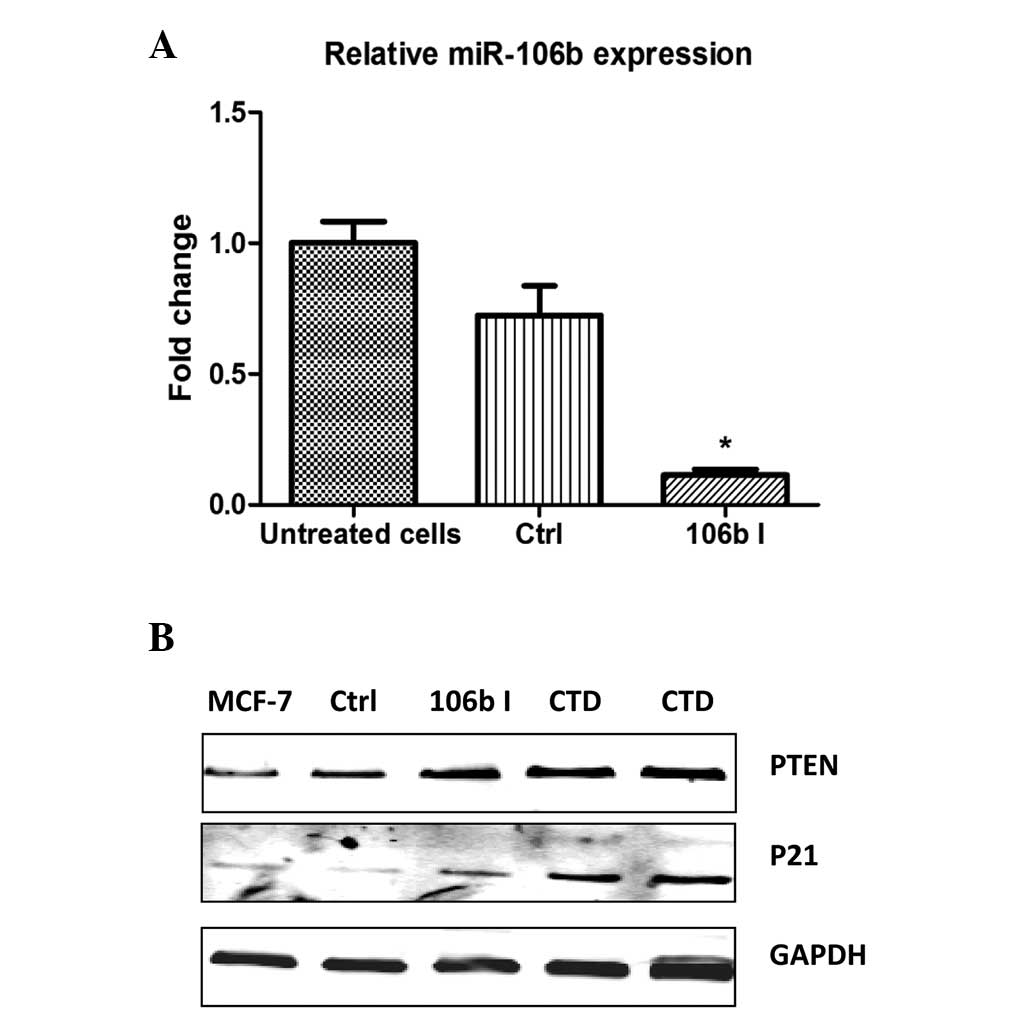Cantharidin (CTD) is one of numerous natural products used in traditional Chinese medicine for the treatment of cancer. The aim of a recent study by researchers from Shanghai University of Traditional Chinese Medicine was to investigate the effects of CTD on changes in the expression of microRNAs (miRNAs/miRs) and to explore its anti‑proliferative effect on MCF‑7 breast cancer cells. The proliferation of MCF‑7 cells was measured by performing an MTT assay. MCF‑7 cells were treated with various concentrations of CTD for 48 h, and the expression profiles of miRNAs in CTD‑treated and ‑untreated MCF‑7 cells were detected using LC Sciences’ miRNA microarray service. Array data were confirmed by reverse transcription‑quantitative polymerase chain reaction and protein expression levels were measured by western blot analysis. The 50% inhibitory concentration of CTD was 1.75 µg/ml following treatment for 48 h and investigators found that CTD significantly inhibited the proliferation of MCF‑7 cells in a dose‑dependent manner (P<0.01).
Furthermore, microarray analysis identified 35 miRNAs that were up‑regulated (fold change ≥2.0 and P<0.01) and 45 miRNAs that were down‑regulated (fold change ≤ 0.5 and P<0.01) in response to CTD treatment. Thus, numerous CTD‑induced miRNAs appeared to be associated with breast cancer. Notably, CTD repressed the expression of miR‑106b‑93, its host gene MCM7 and its transcription factor E2F1. In addition, CTD induced an increase in the protein expression levels of miR‑106b‑93 target genes p21 and phosphatase and tensin homolog. These observations suggest that the modulation of miRNA expression is an important mechanism underlying the biological effects of CTD in breast cancer.

CTD upregulates the expression of PTEN and p21. MCF-7 cells were transfected with 100 nM negative Ctrl inhibitor and 106b I. miR-106b levels were analyzed by (A) reverse transcription-quantitative polymerase chain reaction and (B) western blotting 48 h after transfection. CTD upregulated the expression of PTEN and p-21 proteins. *P<0.01 vs. MCF-7 cells. miR, microRNA; Ctrl, negative control inhibitors; 106b I, miR-106b inhibitor; CTD, cantharidin.
Related Service
miRNA Microarray Service – LC Sciences provides a microRNA (miRNA) expression profiling service using microarrays based on our in-house developed µParaflo® technology platform. We have standard arrays for all mature miRNAs of all species available in the latest version of the miRBase database (Release 21, July 2014). Our service is comprehensive and includes sample labeling, array hybridization, image data processing and in-depth data analysis. Two-three weeks after receiving your total RNA samples, we’ll send you both the raw and fully analyzed data. [Learn more…]
Reference
H. Zhang, X. Yan (2015) Cantharidin modulates the E2F1/MCM7‑miR‑106b‑93/p21‑PTEN signaling axis in MCF‑7 breast cancer cells Onco Lett 10(5):2849-2855. doi: 10.3892/ol.2015.3681 [article]
